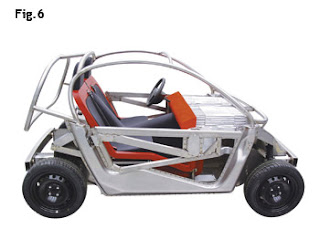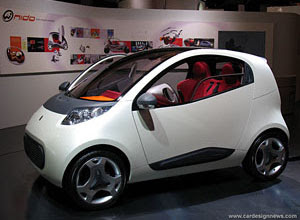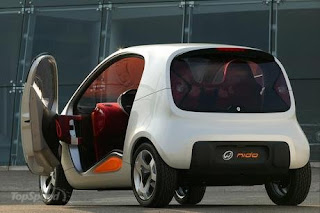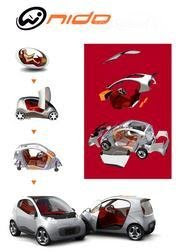 Pininfarina Nido Concept Car in Front
Pininfarina Nido Concept Car in FrontThe design house Pininfarina is responsible for some of the most beautiful four wheeled creations throughout the history of the automobile; however the Italian design studio has also been an innovative force, constantly adapting to the needs of the day in order to ensure the continuation of personal transportation. One thing that any Italian based manufacturing facility is known for is an outright sense of style and the ability to instill beauty into everything they do. That is why Pininfarina has just unveiled their latest concept, the Nido, an attractive, small and safe vehicle geared at replacing densely populated urban environments with a low emissions vehicle that was designed from day one to not only look good but provide peace of mind to the occupants inside.
 Modern Design Pininfarina Nido Concept Car
Modern Design Pininfarina Nido Concept CarThe Nido concept builds upon Pininfarina’s grand tradition of continuous investment in research and development programs in each of the Company’s areas - Design, Engineering and Manufacturing - to quickly and methodically tackle contemporary problems as they arise in the automotive industry.For example, during the 70’s energy crisis, the industry looked towards aerodynamics and alternative energy sources to cut fuel consumption. Pininfarina responded by developing the CNR Energetica 1 prototype, an ideal aerodynamic body and the electric powered Ecos. In the 80’s Pininfarina’s pioneering research into lightweight material application bore the Audi Quartz and Lancia Hit prototypes, which the use of new light metallic and composite materials. The 90’s witnessed to heightened environmental awareness, spawned research into recyclability of materials, improved ergonomics and more efficient vehicle packaging. Pininfarina offered solutions with the Ethos macro-project, a family of three cars with aluminum chassis, recyclable plastic bodywork and innovative, low emission internal combustion engines, highlighted by the 1995 Ethos 3EV zero emissions vehicle
 Pininfarina Nido Concept Car Auto Show
Pininfarina Nido Concept Car Auto ShowMore recently Pininfarina turned their attention to hybrid vehicle research in the Eta Beta and Metrocubo projects which, with reduced dimensions and modular cabins, also answered the problems of both urban and medium range usage.Today the industry is concerned with a problem that Pininfarina had already anticipated with the Sigma,Alfa Romeo P33 and Sigma Grand Prix prototypes: safety.The Nido project dives into the concept of total design: coherent integration of all aspects of the design and engineering of the car. This concept was in fact conceived through an intense collaboration between design and engineering, two poles often opposed, with the singular goal of creating an attractive, small and safe vehicle.
 Simple and Cute Pininfarina Nido Concept Car
Simple and Cute Pininfarina Nido Concept Car By focusing and redefining their respective approaches on a singular goal from day one, new innovative solutions were discovered in the overlap between the aesthetic and the technicalview points.Nido demonstrates Pininfarina’s ability to combine user’s desires with the technical feasibility that allows the project to be built. It marks Pininfarina not only as an innovator today, but shows how Pininfarina is providing solutions for a better tomorrow.

Design Pininfarina Nido Concept Car 2010
In Italian, the word Nido means nest, however we see the compact city car concept as what is usually being safeguarded in a nest, eggs. Some of the design sketches show the early concept as being a round egg shaped vehicle with the passengers occupying a yellowish yolk like protected space in the middle. So the Nido is a 21st century attempt to solve the age-old high school science project, how to keep the insides intact upon impact. Pininfarina’s engineers have designed the Nido with a separate passenger compartment built inside the concept’s frame and body that is connected to the outer shell with energy absorbing cushions placed around the passenger’s compartment. The bright orange polymer cushions would act like springs upon impact, absorbing the forces exerted by the instant deceleration, however unlike energy storing metal coils that would spring back returning all that pressure onto the passengers, a cushion simply acts like an oversized pillow in a briefcase.
No comments:
Post a Comment